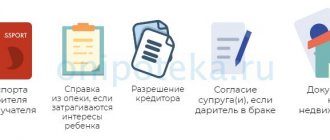About the correctness of terms
First of all, it is necessary to make a reservation that in fact the word “exchange” implies a transfer of the right of use and refers to cases where we are not talking about the owners, but about tenants (for example, municipal apartments).
In a market transaction, it is more correct to talk about me. At the same time, the exchange agreement in its main provisions differs little from the standard purchase and sale agreement. Moreover, in practice, instead of barter, a double transaction for the purchase and sale of real estate is often carried out - this form is more familiar to all parties and has fewer risks.
What rights does municipal housing provide?
Is it possible to exchange a non-privatized apartment?
Another possible scenario is an alternative deal. Its advantage is that there is no strict mutual binding between the seller and the buyer, so the parties have a comfortable “room for maneuver”. The seller gets rid of the apartment he no longer needs and invests the money he receives in purchasing another home.
How to save on accommodation
- Try house sitting. It actually translates to “housekeeping.” Owners go on vacation or on a business trip, but pets remain at home. To look after the apartment, feed the animals and water the plants, the owners allow travelers into the apartment for free. They only ask you to leave a deposit. The owner of the apartment sets the amount of the deposit at his own discretion. It can be 2000 ₽ or 3000 ₽.
This type of travel has long been practiced in America and Europe. In Russia, house sitting is just gaining momentum, and there is no separate website for it yet. You can find such advertisements on advertisement websites or on websites providing home services (forum pomogudarom.ru, Avito, You DO, uslugio.com). True, no one calls this housesitting; most often they write “I’ll look after the house/dacha while you’re away.”
- Try home swapping. In Russia there is a free service “House Exchange”. The idea is that people exchange houses from different cities for a certain period and do not pay for accommodation. In the summer there are many advertisements from those who want to exchange their apartment in the capital for a house by the sea. But there are also the opposite options.
- Try going as a guest. This is another free accommodation option, similar to house sitting. If people are not ready to exchange houses at the same time, then one party invites people to visit their home, and the other promises that they will also invite them to their place later in return. Such advertisements can also be found on the “House Exchange” service.
- If you are vacationing with children, choose hotels where children stay for free up to 12–17 years of age (this service is available in almost all large hotels, information about this is on the hotel’s website in the conditions of accommodation or in the terms of the loyalty program. You can also call and check with the manager ). Some hotels also provide free breakfast. Do not include accommodation and meals. You can save on food if you order ready-made meals through delivery services. Customers receive a discount or free shipping on their first order. Register in the application each time with a new phone number (if you are traveling with a large family or group) and receive discounts. In total, such a vacation will be cheaper than booking a boarding house with three meals a day.
- Look for chain hotels where accommodations are cheaper on weekdays than on weekends. Just go to Booking.com, choose the hotel you like, enter your dates of stay and compare whether prices change depending on weekdays and weekends. To avoid overpaying, make two reservations at different hotels: on weekdays - a chain hotel, and on weekends - a simpler hotel. Don't pay right away, book a room with free cancellation and pay on the spot. If the trip fails, you will not lose money for the hotel.
- Try living in huts. These are small cozy houses in the forest for two or three people. They spread after ecotourism became popular. Such houses have everything you need: a bed, a kitchen, a bathroom, a shower. In the local area you can cook food on the grill. The cost of living in huts ranges from 2,000 rubles to 3,000 rubles per day, but they are not yet available in every city. You can find options by typing “forest cabin rentals” into a search engine. Many hut owners have their own websites or Instagram pages.
Is it that simple?
Exchange (we will use this well-established term) is considered a rather complex operation. The point here is not the procedure: the set of documents is no different from the sale and purchase.
The main difficulty arises when selecting an adequate object (one or several). On the secondary market, a more or less close equivalent is rare. A combination of a large number of parameters (including the age of the house, redevelopment, the need for repairs, the nature of the finishing, the presence of faults, the reputation of neighbors, etc.) makes each lot, if not unique, then much less standardized compared to housing in new buildings. Linking to a specific area, altitude, or building material further narrows the sample. In addition, the tastes and goals of the people participating in the exchange rarely coincide. And this is another reason why direct exchange is giving way to alternative types of transactions.
What if the price of the apartments during the exchange does not match?
Most often, the price of apartments during exchange must be balanced by an additional payment from one of the parties. The amount of the additional payment is determined based on the results of the assessment procedure. It is important to say that the additional payment is not necessarily money: it can be furniture, new renovations, movable property, non-residential objects (garage or parking space, utility room, storage room), etc. In some cases, several lots are sold in order to use the proceeds buy one, and vice versa. Thus, the transaction involves a whole range of various property, which must be described in the contract. Such a document can only be correctly drawn up at a real estate agency, since it requires the participation of qualified realtors, appraisers and lawyers.
What are the risks when exchanging a privatized apartment for a municipal one?
Is it possible to exchange housing between cities?
How to exchange an apartment for another?
In general, to exchange apartments you need to do the following:
1. Find a potential counterparty with a suitable option for exchange (through a real estate company).
2. Draw up an exchange or sale agreement that contains all additional obligations for additional payment and the exact characteristics of the objects involved in the procedure.
3. Collect a package of documents:
- passport,
- title documents,
- extract from the Unified State Register,
- cadastral passport,
- certificates of absence of debt on property taxes and utility bills,
- certificate of family composition,
- certificate of registration or divorce,
- written consent from the spouse,
- draft agreement,
- receipt of payment of state duty,
- application for registration of a transaction.
4. Submit documents to the MFC or directly to Rosreestr.
How does an apartment-to-apartment exchange take place?
When the exchange is equal, the transaction process consists of the following steps.
- Receive an extract from the Unified State Register of Real Estate for both objects. It confirms property rights to housing.
- Make photocopies of personal accounts to confirm the fact that no one else is registered in the apartments.
- Prepare certificates of absence of debts for utility bills.
- Confirm in writing the fact that the exchanged objects are suitable for each other according to certain parameters.
- Draw up an exchange agreement, indicating the following factors: information about the participants, the cost of the objects, their detailed description, the timing of the transaction.
- Contact Rosreestr or MFC to register the transfer of ownership rights, providing authorized persons with all the requested documents.
- Receive an extract from the Unified State Register of Real Estate.
Exchange an apartment with an additional payment for another
Additional payment by one of the parties to the transaction may be required in the following circumstances:
- one of the objects is smaller in area than the other;
- one object is in the city, and the second is in the village;
- one object is in disrepair, and the second is in a new building.
Trade-in transactions are also often accompanied by an additional payment.
The amount of the surcharge depends on the following factors:
- differences in the condition of the apartments: repairs, operation of the water supply system, gas, electricity, and plumbing;
- the amount of funds received from the sale and necessary for a person to purchase a new apartment (the lower the amount, the greater the surcharge);
- location of housing: if the apartment is located close to a kindergarten, school, hospital and has developed infrastructure, then its cost will be higher (compared to properties built in undeveloped areas on the outskirts of the city).
The exchange process with an additional payment is similar to an equivalent exchange, but the agreement specifies the following information:
- amount of surcharge;
- deadlines for making additional payments;
- method of settlement between parties to a transaction.
Exchange of mortgage apartment
The exchange of a mortgaged apartment is permitted by law, but in reality participants may encounter difficulties.
- To exchange a mortgage on an apartment, you must obtain written permission from the lender. At the same time, some banks require either full repayment of the mortgage or the paid part of the debt (stable payment without delays for several years).
- When an exchange is completed, the purchased housing becomes collateral. The purchase must be approved by the lender, for which it is necessary to contact a professional appraiser and conduct an appraisal of the home.
The mortgage exchange process itself consists of the following steps:
- execution of two agreements - for the sale of housing (even after alienation it will be the subject of collateral) and for the purchase of a new apartment;
- registration of ownership rights to the purchased housing, establishment of encumbrances on it;
- obtaining consent from the bank to remove the collateral from the previous apartment.
The exchange of mortgage housing is permissible only through purchase and sale.
Exchange of a non-privatized apartment
If the apartment belongs to the state or municipality, then it is allowed to exchange it for housing with the same status. The exchange can be equivalent and with an additional payment. It is necessary to obtain permission to conduct a transaction from all family members.
To exchange non-privatized housing, you must obtain permission from local municipal authorities by providing authorized persons with the following package of documentation:
- application requesting a permit;
- social rent agreement;
- object exchange agreement;
- employer's passport;
- extract from the house register;
- an extract confirming the absence of debts for utilities and accommodation;
- permission from guardianship officials (if there are incapacitated children in the family);
- paper on the sanitary and technical condition of housing;
- technical passport, certificate of the estimated value of the object (issued in the BTI);
- photocopies of documentation for the apartment into which the tenant plans to move;
- permission from family members to conduct a transaction, certified by an employee of a notary agency.
Permission to conduct a transaction must be obtained even from those relatives who are temporarily absent from the apartment.
The application is reviewed within 10 days. Basically, employees of municipal authorities make positive decisions, but there are also grounds for refusal - for example, the house is subject to demolition or the tenant has received a claim for the annulment of the social tenancy agreement.
If employers live in different districts of the city or in different cities, then they will need to contact the administration of their district or city. Next, each participant in the procedure in the new place will draw up a social rent agreement with local administrative authorities, after which they will register in the new apartment.
Advantages of exchanging non-privatized housing:
- there is no fee for exchanging apartments (but if the matter comes to trial, costs and expenses will have to be paid);
- there is no risk of losing housing rights or funds;
- Crime stories don't happen in this area.
However, there is also a drawback - it is difficult to find suitable non-privatized housing, because only 20% of housing in Russia is the property of the state/municipality. The likelihood that the mutual requirements of tenants regarding the condition of housing will coincide is extremely low. For this reason, many first register such housing as private property, after which they dispose of it at their own discretion - exchange, sell.
No one has the right to refuse to exchange personal housing - there is only a risk of challenging the transaction in the future (for example, one of the participants is incapacitated). In a situation with non-privatized housing, the reasons for refusal are inadequate conditions, a ban from the guardianship authorities, a decision to evict the tenant in court (or cancellation of a social tenancy agreement).
How does a mortgage apartment exchange work?
The law does not impose special restrictions on the exchange of an apartment or house with an outstanding loan. But such a transaction must necessarily involve the bank that issued the loan. And this procedure is far from formal. From the bank’s point of view, the collateral object is changing, and the new object must be no less liquid and of high quality than the previous one. Banks are more willing to agree to an exchange if the borrower has been making payments accurately for at least two years. Bank employees must ensure that the property is legally clean and in good condition.
The borrower contacts the bank with an application to approve the exchange or sale. The application must be accompanied by a passport, identification number, marriage certificate, passport and written consent of the spouse, as well as a document confirming the absence of debt on mortgage payments.
Alternative deal: how does it work?
What are the advantages of an alternative deal?
If we are talking about a direct exchange, the bank imposes a mortgage encumbrance on the new property and removes it from the previous one.
If the borrower moves to a more expensive apartment, they use a different scheme based on the purchase and sale agreement. The client submits an application for approval and an application for a new loan - the bank places an encumbrance on the new loan on the new object (all documents must also be collected for it) and removes the encumbrance from the previous object, which the counterparty receives under the purchase and sale transaction.
The most difficult option is to exchange for an apartment of a smaller area with an additional payment. Banks rarely agree to such transactions because the value of the collateral decreases. The solution could be a consumer loan that covers the balance of the mortgage debt. The additional payment received as a result of the exchange will somewhat soften the costs.
What does it represent?
Where did this come from?
This phenomenon, that is, the exchange of vacation properties, has existed for more than 50 years in America and Europe . The very idea of such a budget vacation belongs to students who have always been interested in traveling, and the money issue has always been acute.
When there was no all-powerful Internet yet, advertisements were simply published in newspapers. Well, with the advent of the World Wide Web it gained a very serious scope. For Russia, this is a relatively new type of budget holiday.
What benefits does it provide?
The advantages, of course, are serious.
- This method of relaxation allows you to significantly save your finances.
- This is a unique opportunity to completely immerse yourself in the ordinary life and rhythm of another city (or country).
- The length of stay is not limited by the duration of the tourist package; you can determine the desired period yourself.
- New contacts, new friendships appear, and this is always pleasant and useful.
- The feeling of home comfort away from your own home is worth a lot.
Flaws
Of course, there are also “cons”, but there are not many of them:
- You need to plan your trip in advance to choose the right option.
- There is a risk of encountering an unscrupulous tenant, because you will need to provide your housing to strangers.
Where to look for options?
You need to look for various exchange options on special web resources. The most popular among them are the following:
- HomeExchange.com is a convenient (English-language) resource, everything is extremely simple and open. Here, exchange is offered only on a two-way basis, which means that before choosing a suitable housing option for yourself (in another country), you must register and first offer your housing (leave your ad).
- ObmenDomami.ru is a large Russian-language service where you can find options not only for exchange holidays, but also for renting housing from hosts and even offers to “come and stay.”
- Сouchsurfing.com is a Russian-language website of the “Couchsurfing” community (sofa surfing). This is one of the most convenient resources, just go in, fill out a form and that’s it. The hospitality exchange club works great thanks to enthusiasts who are always ready to help find the right option - where to spend the night or stay.








